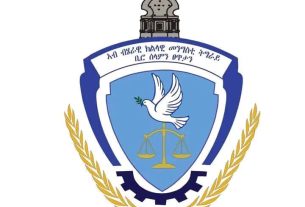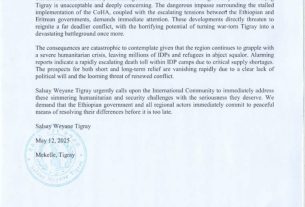Mekelle, Tigray, May 14, 2025
Historian Tesfakiros Arefe Dismisses Amhara Claims on Western Tigray: “No Historical, Demographic, or Constitutional Basis”
Tesfakiros Arefe, a renowned historian and expert on Tigray’s political and administrative history, has forcefully rejected the claims made by Amhara regional elites over the territory of Western Tigray. In a wide-ranging interview with Addis Standard, Tesfakiros emphasized that there is “no historical, demographic, or constitutional basis” to justify the forcible annexation of the region.
“Western Tigray, including Wolkait, has been historically and demographically Tigrayan. For example, the 2007 Ethiopian census shows that 97% of the population in Wolkait were Tigrigna speakers,” said Tesfakiros. He added that the occupation of the area by Amhara forces is part of a broader agenda to politically weaken Tigray and disrupt its territorial integrity.
According to Tesfakiros, the constitutional framework clearly outlines the legal mechanisms for resolving territorial and identity-related disputes. However, these have been ignored in favor of violent occupation and political bargaining. “The solution is straightforward: the forcibly occupied territories must be returned to Tigray, its administrative and security structures must be reinstated, and displaced citizens must be allowed to return,” he asserted.
Tesfakiros warned that the current stance of the federal government, which he accuses of dishonesty and using Western Tigray as a political bargaining chip, risks undermining the Pretoria Peace Agreement and deepening the crisis. “The federal government has not upheld its commitment under the peace deal. While Tigray has handed over its heavy weapons, the promised withdrawal of non-ENDF forces—specifically Amhara militias—has not occurred,” he noted.
He also cautioned that continued violations of the Constitution and the spirit of federalism are fueling widespread political disillusionment, especially in Tigray, where trust in the federal system has eroded. “The people of Tigray must be given the right to decide their future, including whether to remain part of the Ethiopian federation,” he said.
Tesfakiros linked the erosion of constitutional order and rising violence to what he described as a coordinated effort by the “Oro-Mara” political elite—a coalition of Oromo and Amhara power blocs—to dismantle Ethiopia’s multinational federal arrangement and impose a unitary state structure. This, he said, has led to ethnic cleansing in Tigray, repression in Oromia, and new regional tensions.
Rejecting claims that the federal constitution is the cause of Ethiopia’s instability, Tesfakiros argued instead that the failure lies in its implementation and the authoritarian impulses of both past and current ruling parties. “The Constitution isn’t the problem. The problem is the unconstitutional actions and the extra-legal efforts by elites to rewrite Ethiopia’s political order,” he said.
As debate over Ethiopia’s constitutional future intensifies, Tesfakiros urged the international community to move beyond the narratives provided by hegemonic unitary elites and better understand the lived realities and aspirations of Ethiopia’s diverse nations and nationalities.




